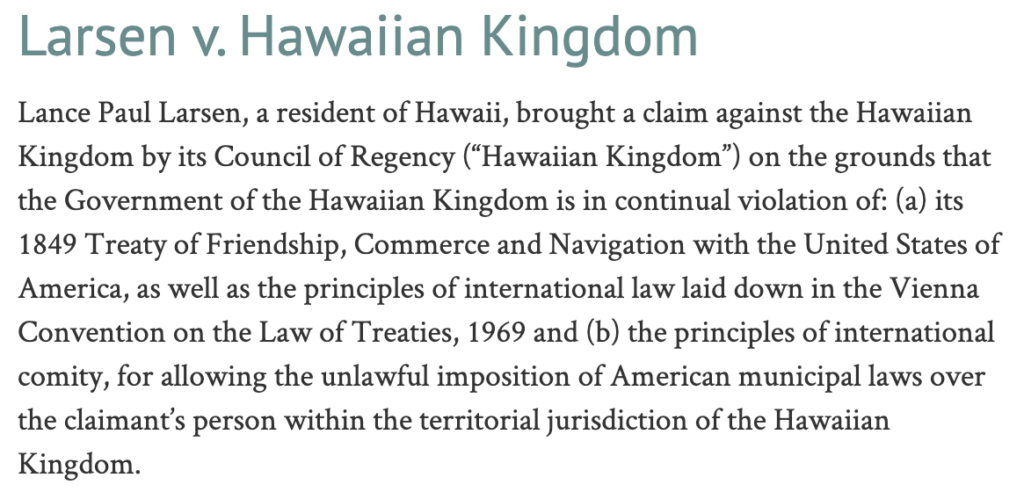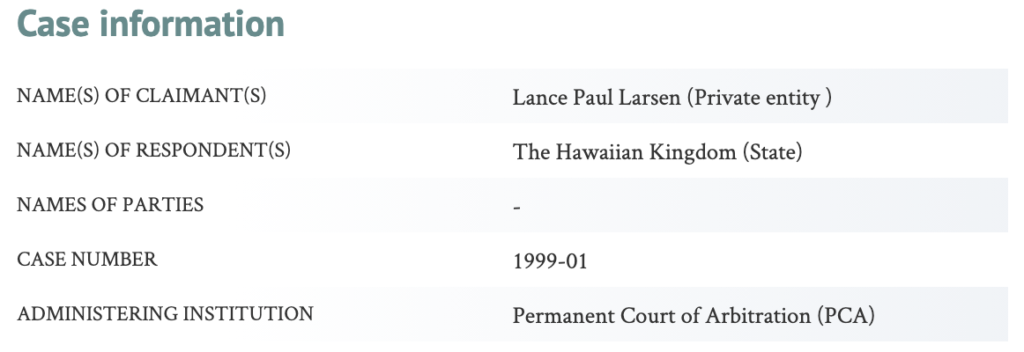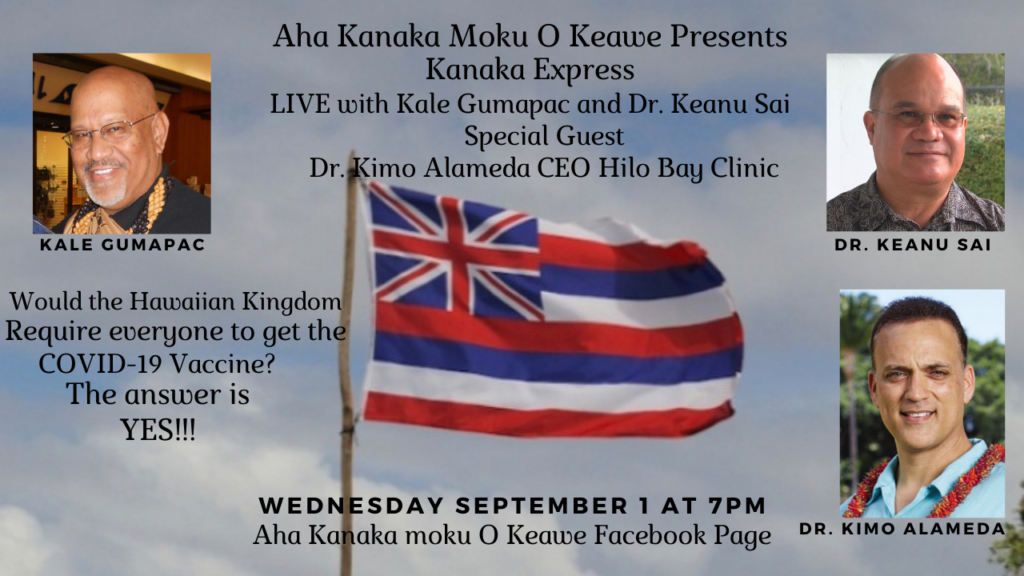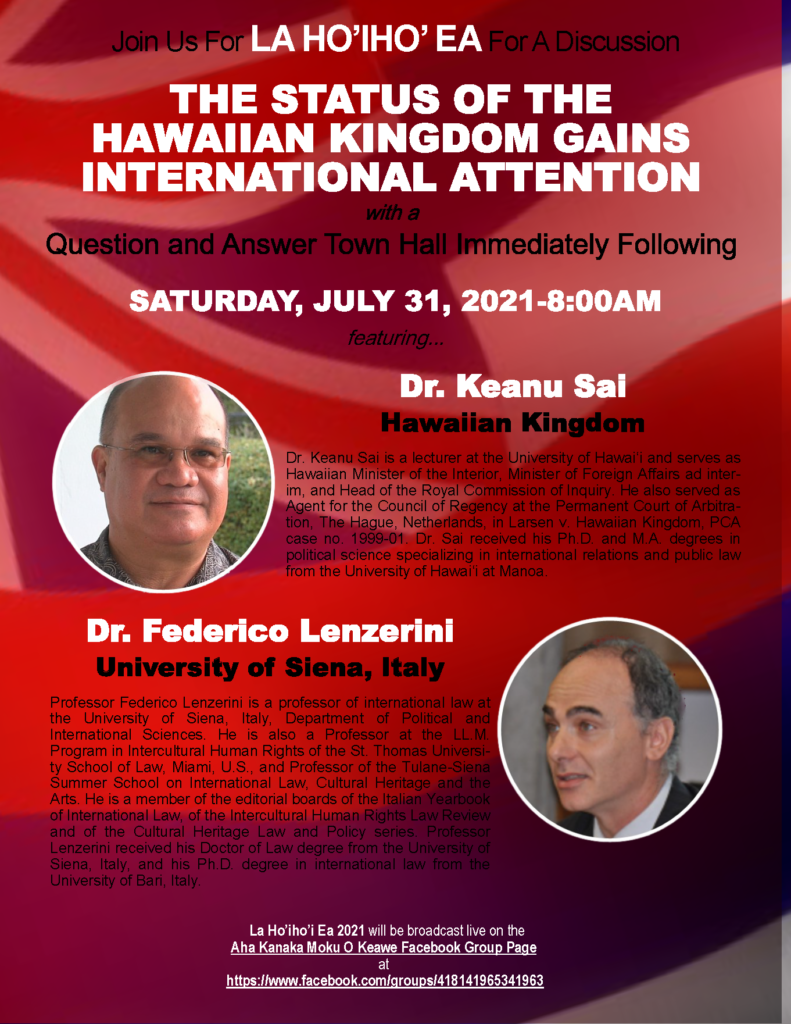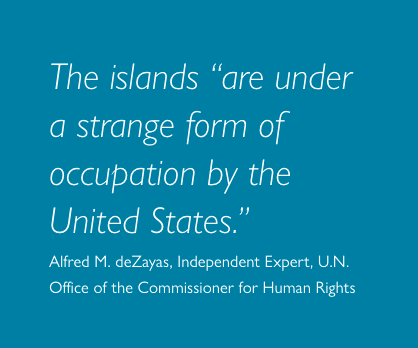Since the United States Congress enacted a joint resolution purporting to annex the Hawaiian Islands, which was signed by President McKinley into U.S. law on July 7, 1898, American municipal laws have been illegally imposed within the territorial jurisdiction of the Hawaiian Kingdom. U.S. constitutional scholar, Westel Willoughby, wrote at the time of the purported annexation by legislative act:
The constitutionality of the annexation of Hawaii, by a simple legislative act, was strenuously contested at the time both in the Congress and by the press. The right to annex by treaty was not denied, but it was denied that this might be done by a simple legislative act…Only by means of treaties, it was asserted, can the relations between States be governed, for a legislative act is necessarily without extraterritorial force—confined in its operation to the territory of the State by whose legislature it is enacted.
westel woodbury willoughby, the constitutional law of the United states §239 (1929).
Along the same lines, the Hawaiian Kingdom Supreme Court, in In re Francis de Flanchet in 1858, stated that the “laws of a nation cannot have force to control the sovereignty or rights of any other nation within its own jurisdiction. And however general and comprehensive the phrases used in the municipal laws may be, they must always be restricted in construction, to places and persons upon whom the Legislature have authority and jurisdiction.” There is no treaty transferring Hawaiian territory to the United States. As such, the Hawaiian Kingdom continued to exist as an independent State that was acknowledged by the United States in arbitral proceedings before the Permanent Court of Arbitration in Larsen v. Hawaiian Kingdom despite the unlawful overthrow of its government by the United States on January 17, 1893.
On the subject of the 1898 joint resolution of annexation of the Hawaiian Islands, the U.S. Department of Justice’s Office of Legal Counsel, after covering the territorial limits of legislative acts, concluded in a 1988 legal opinion, “It is therefore unclear which constitutional power Congress exercised when it acquired Hawaii by joint resolution. Accordingly, it is doubtful that the acquisition of Hawaii can serve as an appropriate precedent for a congressional assertion of sovereignty over an extended territorial sea.” The complaint states:
If it was unclear how Hawai‘i was annexed by legislation, it would be equally unclear how the Congress could create a territorial government, under an An Act to provide a government for the Territory of Hawaii in 1900, within the territory of a foreign State by legislation. It would also be unclear how the Congress could rename the Territory of Hawai‘i to the State of Hawai‘i in 1959, under an Act To provide for the admission of the State of Hawai‘i into the Union by legislation.
International law at the time obligated the United States to administer Hawaiian Kingdom law after it unlawfully overthrew the Hawaiian Kingdom Government. The law of occupation was triggered after the United States, as the occupying State, secured effective control over Hawaiian territory. This effective control began when Queen Lili‘uokalani conditionally surrendered to the United States President on January 17, 1893. The Queen stated:
Now, to avoid any collision of armed forces and perhaps the loss of life, I do, under this protest, and impelled by said force, yield my authority until such time as the Government of the United States shall, upon the facts being presented to it, undo the action of its representatives and reinstate me in the authority which I claim as the constitutional sovereign of the Hawaiian Islands.
UNITED STATES HOUSE OF REPRESENTATIVES, 53RD CONGRESS, EXECUTIVE DOCUMENTS ON AFFAIRS IN HAWAII: 1894-95 (1895), 586.
President Cleveland initiated a presidential investigation on March 11, 1893 by appointing Special Commissioner James Blount to travel to the Hawaiian Islands and to provide periodic reports to the U.S. Secretary of State Walter Gresham. Commissioner Blount arrived in the Islands on March 29th, where he “directed the removal of the flag of the United States from the government building and the return of the American troops to their vessels.” His first report was dated April 6, 1893, and his final report was dated July 17, 1893. On October 18, 1893, Secretary of State Gresham notified the President:
The Provisional Government was established by the action of the American minister and the presence of the troops landed from the Boston, and its continued existence is due to the belief of the Hawaiians that if they made an effort to overthrow it, they would encounter the armed forces of the United States.
The earnest appeals to the American minister for military protection by the officers of that Government, after it had been recognized, show the utter absurdity of the claim that it was established by a successful revolution of the people of the Islands. Those appeals were a confession by the men who made them of their weakness and timidity. Courageous men, conscious of their strength and the justice of their cause, do not thus act. …
The Government of Hawaii surrendered its authority under a threat of war, until such time only as the Government of the United States, upon the facts being presented to it, should reinstate the constitutional sovereign…
Should not the great wrong done to a feeble but independent State by an abuse of the authority of the United States be undone by restoring the legitimate government? Anything short of that will not, I respectfully submit, satisfy the demands of justice.
UNITED STATES HOUSE OF REPRESENTATIVES, 53RD CONGRESS, EXECUTIVE DOCUMENTS ON AFFAIRS IN HAWAII: 1894-95 (1895), 462-463.
When negotiations began at the U.S. Legation in Honolulu on November 13, 1893, U.S. Minister Albert Willis stated to the Queen the position taken by the President after a full investigation. Willis expressed “the President’s sincere regret that, through the unauthorized intervention of the United States, she had been obliged to surrender her sovereignty, and his hope that, with her consent and cooperation, the wrong done to her and to her people might be redressed.” “To this,” Willis noted, “she bowed her acknowledgements.” Negotiations continued for another month. The illegality of the overthrow was due to the international principle of non-intervention in the internal affairs of another State.
President Cleveland delivered a manifesto to the Congress on his investigation into the overthrow of the Hawaiian Government on December 18, 1893. The President concluded that the “military occupation of Honolulu by the United States…was wholly without justification, either as an occupation by consent or as an occupation necessitated by dangers threatening American life and property.” He also determined “that the provisional government owes its existence to an armed invasion by the United States.” Finally, the President admitted that by “an act of war…the Government of a feeble but friendly and confiding people has been overthrown.” Referring to the annexation plot of the insurgents, Cleveland concluded “that the United States could not, under the circumstances disclosed, annex the islands without justly incurring the imputation of acquiring them by unjustifiable methods.”
Unbeknownst to the President, an agreement of peace was reached on the very same day Cleveland gave his manifesto to the Congress. Gresham acknowledged receipt of Willis’ dispatch of the agreement dated December 20, 1893, in a telegram of January 12, 1894, in which he stated, “Your reports show that on further reflection the Queen gave her unqualified assent in writing to the conditions suggested.” According to the executive agreement, by exchange of notes, the President committed to restoring the Queen as the constitutional sovereign, and the Queen agreed, after being restored, to grant a full pardon to the insurgents. As a constitutional monarch, however, the agreement required an additional signature of a cabinet minister to make it binding under Hawaiian constitutional law. Article 42 of the 1864 Constitution provides, “No act of the [Monarch] shall have any effect unless it be countersigned by a Minister, who by that signature makes himself responsible.”
The United States neither complied with international humanitarian law and the law occupation nor did it carry out the international agreement of restoring Queen Lili‘uokalani as the Executive Monarch. Instead, the United States concealed this history and the unlawful seizure of Hawaiian territory by embarking on a sinister plan of denationalization through Americanization across the Hawaiian Islands in 1906. This plan was implemented throughout the schools, both public and private, in a deliberate effort to brainwash school children into believing they are American citizens and that Hawai‘i sought to be incorporated as a U.S. territory.
Within three generations since its implementation, the national consciousness of the Hawaiian Kingdom had become erased. This was the ultimate aim of the insurgency, which was evidenced in the record of a Council of State meeting of the so-called Republic of Hawai‘i in 1895. Samuel Damon, who served as the group’s Vice-President, stated, “If we are ever to have peace and annexation the first thing to do is to obliterate the past.” According to political scientist Lorenz Gonschor,
American indoctrination of the people of Hawai‘i had profound negative consequences not only on Hawaiian culture and identity, but also on the islands’ historiography. As soon as the Missionary Party—or, as loyalist newspaper editor Edmund Norrie called them, the American Mafia—had taken the reins of power, they began to systemically rewrite the country’s history and obscure and discredit the achievements of the Hawaiian Kingdom.
Lorenz Gonschor, a Power in the world: the Hawaiian Kingdom in Oceania (2019), 158.
This obliteration of Hawaiian national consciousness had effectively erased, in the minds of generations to date, the United States invasion of the Hawaiian Kingdom on January 16, 1893, and the unlawful overthrow of Hawaiian government the day after. In order to better understand the effects of denationalization download Dr. Keanu Sai’s article published by the University of Hawai‘i at Mānoa’s Hawaiian Journal of Law and Politics titled “Setting the Record Straight on Hawaiian Indigeneity.”
International humanitarian law views denationalization within the occupied territory as a war crime. According to Professor William Schabas, denationalization is one of the war crimes currently being committed in Hawai‘i, which are “actions directed at the destruction of the national identity and national consciousness of the population” of the Hawaiian Kingdom. The unlawful imposition of American municipal laws for over a century since 1898 is also the war crime of usurpation of sovereignty. Professor Schabas also stated, “the Occupying Power must not change the demographic, social and political situation in the territory it has occupied to the social and economic detriment of the population living in the occupied territory.” The unlawful imposition of American municipal laws did radically change the “demographic, social and political situation” of the Hawaiian Kingdom.
To fully understand the scope and magnitude of the prolonged American occupation of the Hawaiian Kingdom download the free eBook titled “The Royal Commission of Inquiry: Investigating War Crimes and Human Rights Violations Committed in the Hawaiian Kingdom (2000). Activities and reports by the Royal Commission of Inquiry can be accessed here.
On May 20, 2021, Dexter Ka‘iama, Attorney General for the Hawaiian Kingdom, filed a complaint for declaratory and injunctive relief (Hawaiian Kingdom v. Biden et al.). Defendants named in the complaint include President Joseph Biden and other officers of the United States Federal government, the State of Hawai‘i and Counties and its officers, as well as 32 foreign consulates unlawfully established in the Hawaiian Kingdom, which include Australia, Austria, Bangladesh, Belgium, Brazil, Chile, Czech Republic, Denmark, Finland, France, Germany, Hungary, India, Italy, Japan, Luxembourg, Mexico, Morocco, Netherlands, New Zealand, Norway, Philippines, Poland, Portugal, Slovenia, South Korea, Spain, Sri Lanka, Sweden, Switzerland, and Thailand.
What is significant about this action taken by the Council of Regency, as the government of the Hawaiian Kingdom, is that the United States Federal Court cannot invoke the political question doctrine that would be the basis for dismissal. The political question doctrine is where there is a question as to the sovereignty of a country, the federal courts will defer the answer to this question by the President as head of the executive branch. Once the President, through its Department of State, explicitly recognizes the sovereignty of a country the courts are bound by that recognition.
In other words, since the United States, by its embassy in the Netherlands which is a member of the Permanent Court of Arbitration (PCA) Administrative Council, explicitly recognized the Hawaiian Kingdom as a non-Contracting State in accordance with article 47 of the 1907 PCA Convention in the Administrative Council’s annual reports from 2000 to 2011, it answered the political question in the affirmative that the Hawaiian Kingdom continues to exist as an independent State and the Council of Regency is its government. The complaint explains:
102. The explicit recognition by the United States of the continued existence of the HAWAIIAN KINGDOM as a State and the Council of Regency as its government prevents the denial of this civil action in the courts of the United States under the political question doctrine. In Williams v. Suffolk Insurance Co., the Supreme Court rhetorically asked whether there could be “any doubt, that when the executive branch of the government, which is charged with our foreign relations…assumes a fact in regard to the sovereignty of any island or country, it is conclusive on the judicial department. In Sai v. Clinton and in Sai v. Trump the court erred when it invoked the political question doctrine. In both cases the plaintiff provided evidence of the Hawaiian Kingdom’s continuity by virtue of the proceedings at the Permanent Court of Arbitration in Larsen v. Hawaiian Kingdom.
103. In Jones v. United States, the Supreme Court concluded that “[w]ho is the sovereign, de jure or de facto, of a territory is not a judicial, but is a political, question, the determination of which by the legislative and executive departments of any government conclusively binds the judges, as well as all other officers, citizens, and subjects of that government. This principle has always been upheld by this Court, and has been affirmed under a great variety of circumstances.” As a leading constitutional scholar, Professor Corwin, concluded, “[t]here is no more securely established principle of constitutional practice than the exclusive right of the President to be the nation’s intermediary in its dealing with other nations.” The ‘executive’ did determine ‘[w]ho is the sovereign’ of the HAWAIIAN KINGDOM, and, therefore, since there is no political question, it ‘binds the judges, as well as all other officers, citizens, and subjects of that government.’
Not only did the United States explicitly recognized the continuity of the Hawaiian Kingdom as a member of the PCA Administrative Council but also the other 32 countries that have unlawfully established foreign consulates in Hawaiian territory. These 32 countries along with the United States are members of the PCA Administrative Council. As a result, the named defendants and the U.S. Federal Court are prevented from raising the political question doctrine. To understand how the United States explicitly recognized the continuity of the Hawaiian Kingdom see the Preliminary Report of the Royal Commission of Inquiry.
Under the first Count (Supremacy Clause) of the cause of action in the complaint, the Defendant State of Hawai‘i is prohibited from “any curtailment or interference” of the Defendant United States of America’s explicit recognition of the Council of Regency as the government of the Hawaiian Kingdom.
Under the second Count (Usurpation of Sovereignty) of the cause of action in the complaint, in enacting and implementing the laws of the United States, to include the laws of the State of Hawai‘i and its Counties, i.e., the United States constitution, State of Hawai‘i constitution, Federal and State of Hawai‘i statutes, County ordinances, common law, case law, administrative law, and the maintenance of United States military installations, Defendants who are officers of the Federal, State and County governments have exceeded their statutory authority, engaged in violating the 1849 Hawaiian-American Treaty of Friendship, Commerce and Navigation, the 197 Hague Regulations, the 1907 Hague Convention, V, and the 1949 Fourth Geneva Convention, and has failed to comply with international humanitarian law by administering the laws of the Hawaiian Kingdom, which include the 1864 constitution, statutes, common law, case law, and administrative law.
Under the third Count (Pillaging and Destruction of Property) of the cause of action in the complaint, international humanitarian law prohibits pillaging and destruction of property through the collection of taxes that are exacted from the residents of the Hawaiian Kingdom by the Internal Revenue Service of the Defendant United States of America and the Department of Taxation of the Defendant State of Hawai‘i in violation of Article 8 of the 1849 Hawaiian-American Treaty of Friendship, Commerce and Navigation, Article 43 of the 1907 Hague Regulations, and Article 64 of the 1949 Fourth Geneva Convention.
Under the final Count (Exequaturs) of the cause of action in the complaint, international humanitarian law prohibits usurpation of sovereignty by granting exequaturs to foreign consulates under American municipal law within the territory of the Hawaiian Kingdom in violation of the Article 8 of the 1849 Hawaiian-America Treaty of Friendship, Commerce and Navigation, Article 43 of the 1907 Hague Regulations, and Article 64 of the 1949 Fourth Geneva Convention.
The Hawaiian Kingdom is asking the Court to:
Declare that all laws of the Defendants United States of America and the State of Hawai‘i and its Counties, to include the United States constitution, State of Hawai‘i constitution, Federal and State of Hawai‘i statute, County ordinances, common law, case law, administrative law, and the maintenance of Defendant United States of America’s military installations are unauthorized by, and contrary, to the Constitution and Treaties of the United States;
Enjoin Defendants from implementing or enforcing all laws of the Defendant United States of America and the State of Hawai‘i and its Counties, to include the United States constitution, State of Hawai‘i constitution, Federal and State of Hawai‘i statute, County ordinances, common law, case law, administrative law, and the maintenance of Defendant United States of America’s military installations across the territory of the Hawaiian Kingdom, to include its territorial sea;
Enjoin Defendants who are or agents of foreign diplomats from serving as foreign consulates within the territorial jurisdiction of the Hawaiian Kingdom until they have presented their credentials to the Hawaiian Kingdom Government and received exequaturs; and
Award such additional relief as the interests of justice may require.
On May 21, 2021, an Order was signed by Chief Judge J. Michael Seabright setting a scheduling conference over the telephone at 9:00am on July 19, 2021 before Magistrate Judge Rom Trader.

